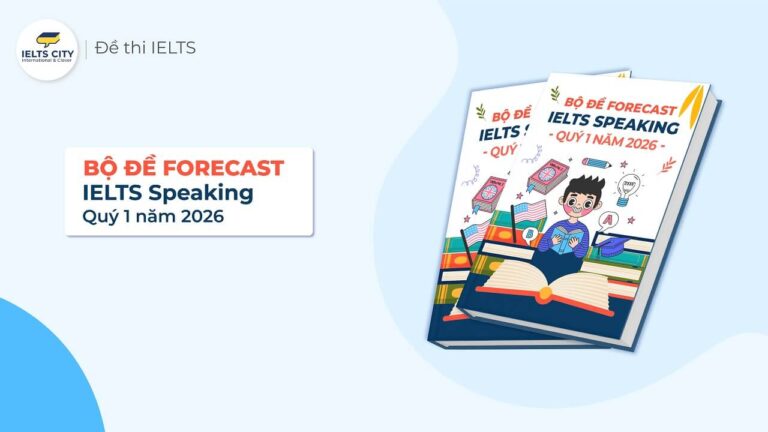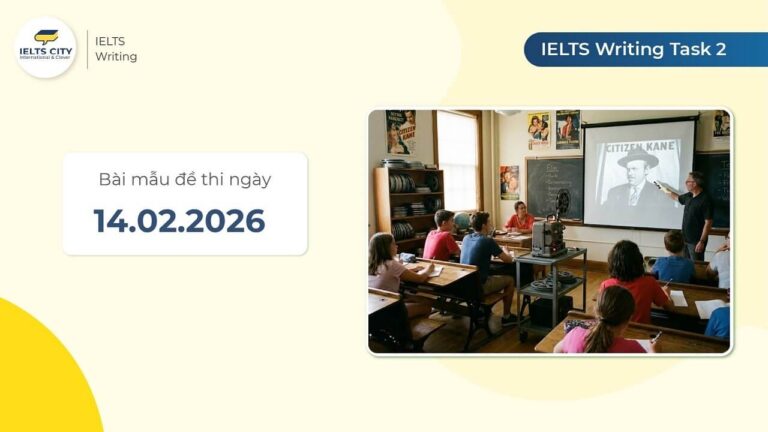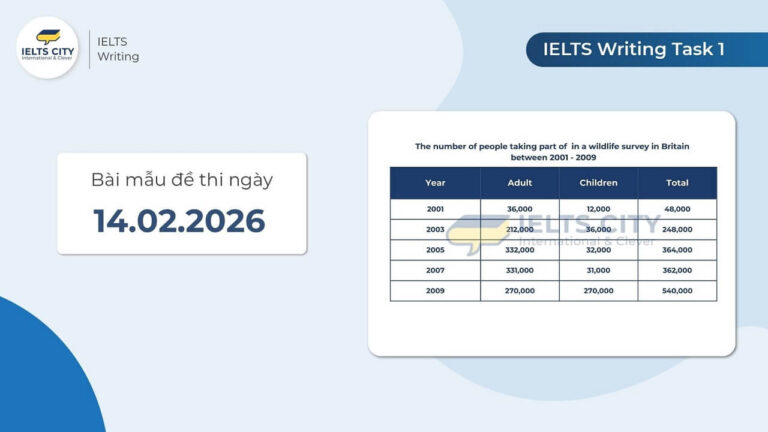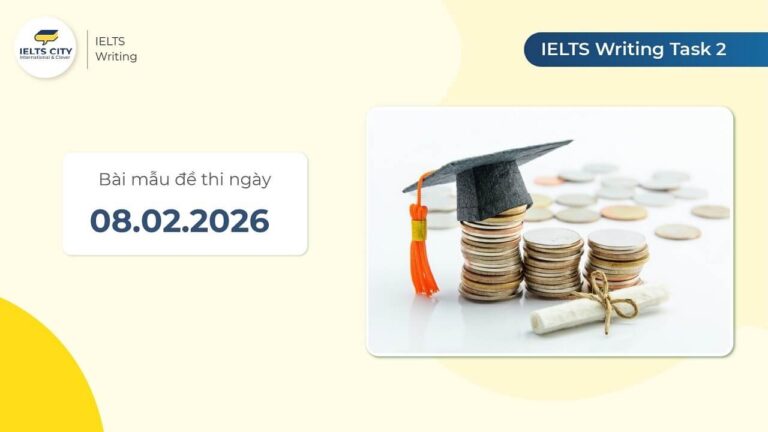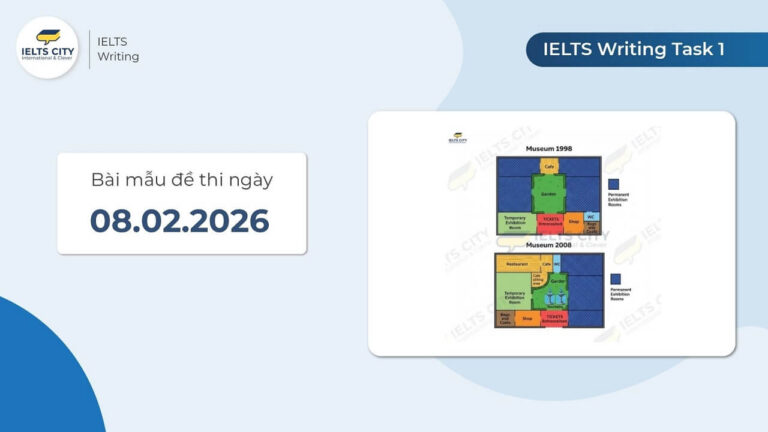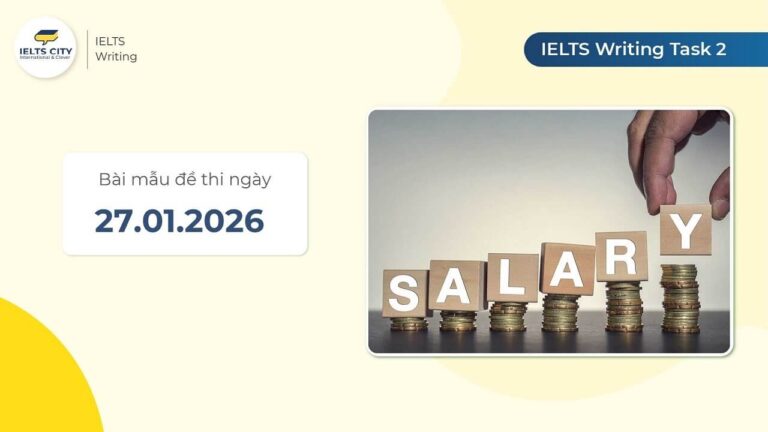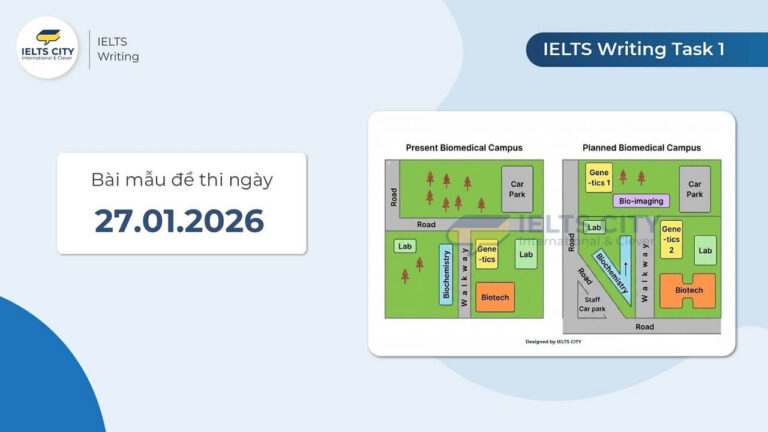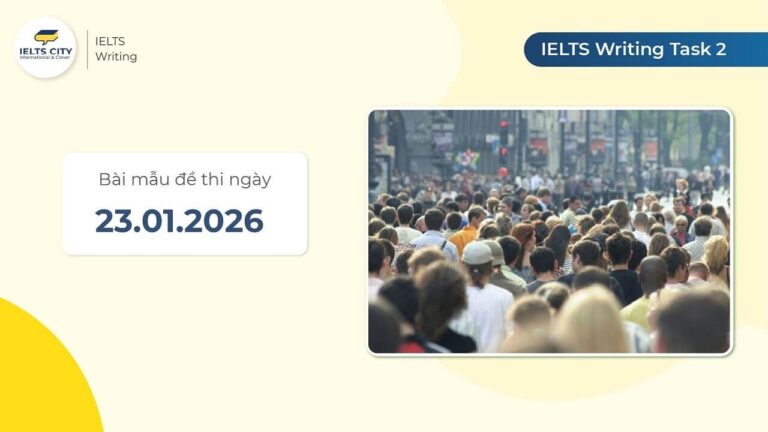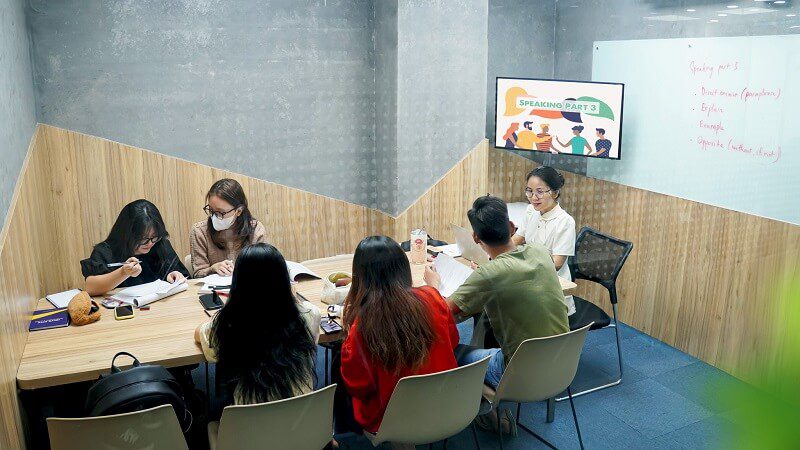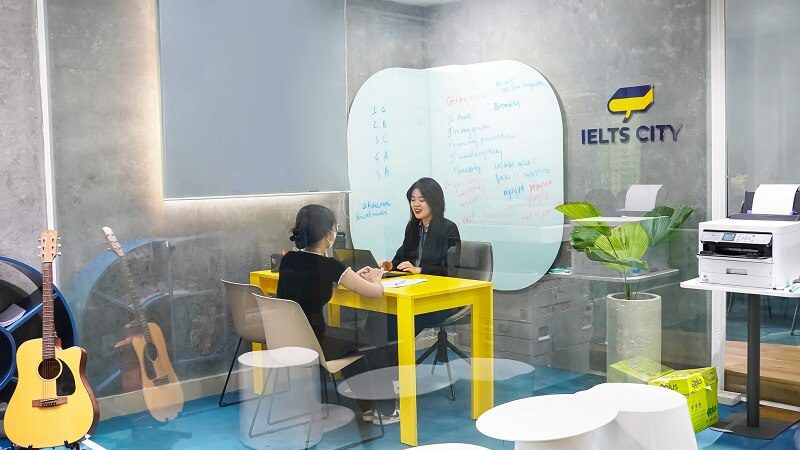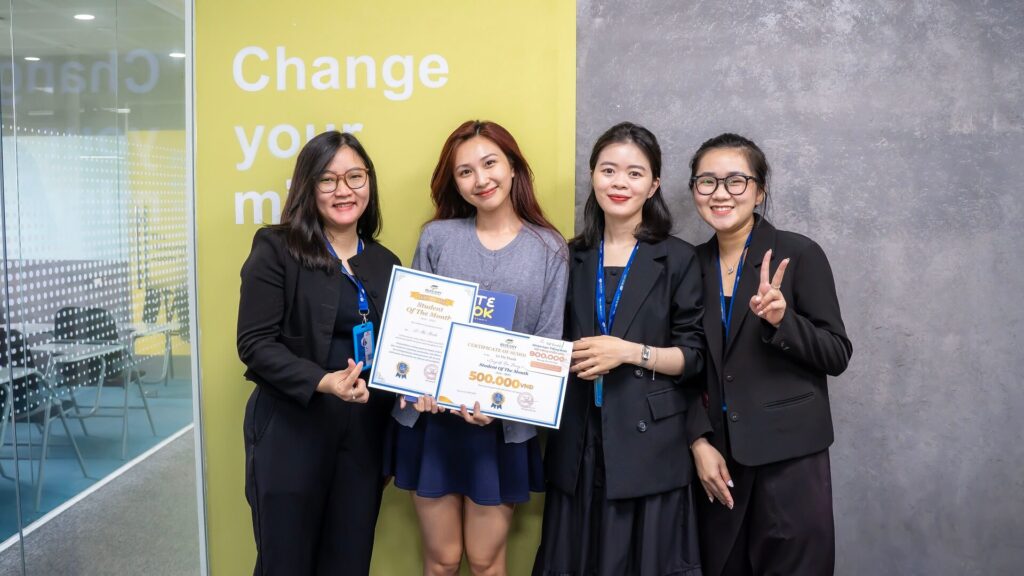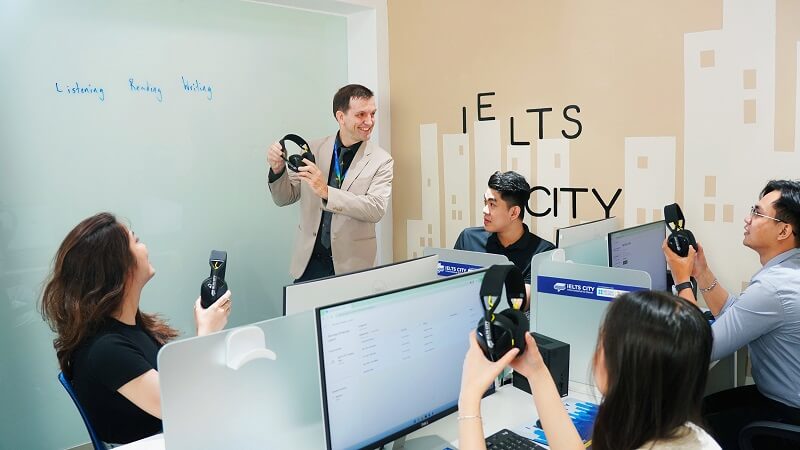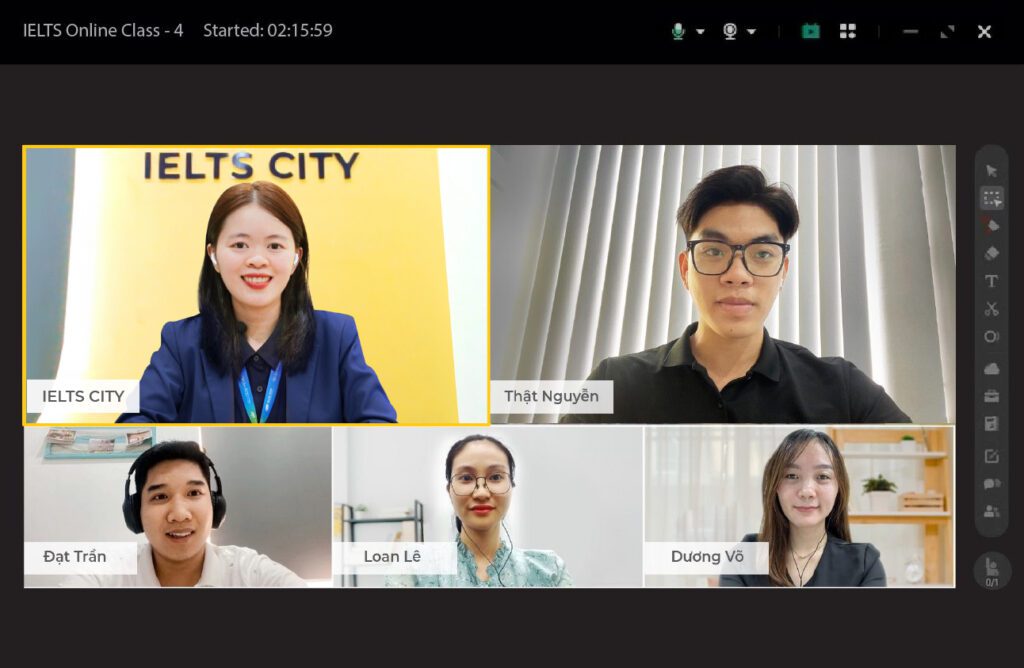Đề thi IELTS Writing task 2 ngày 21.01.2023 là dạng Problem and Solution thuộc topic Environment. Đề bài này yêu cầu chúng ta bàn luận về vấn đề gia tăng sản xuất hàng tiêu dùng gây ra thiệt hại với môi trường tự nhiên. Để có thể ghi điểm tốt cho đề này, các bạn hãy cùng IELTS CITY tham khảo bài mẫu band 7.5 cùng với những từ vựng highlight phía sau nhé!
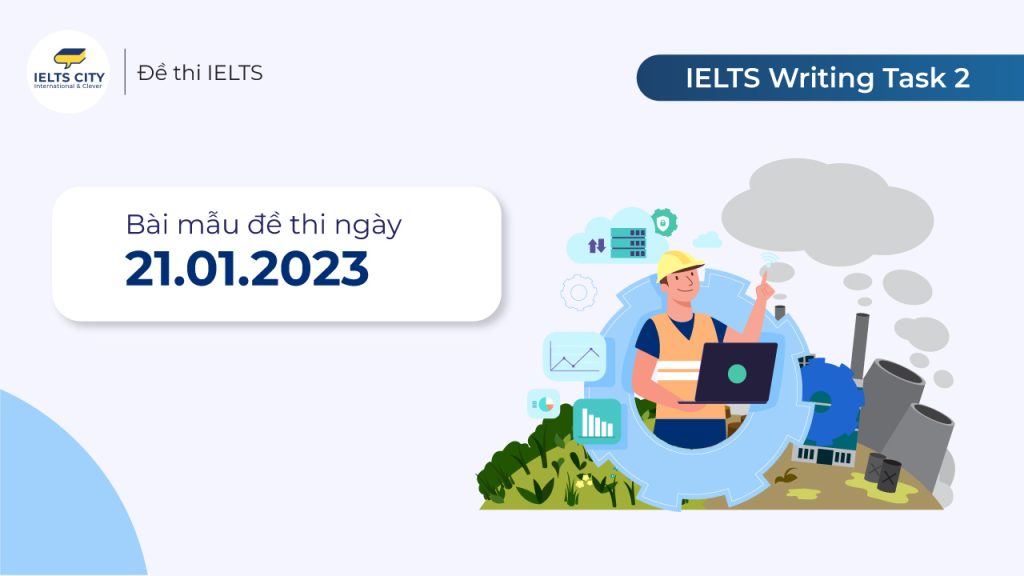
Nội dung chính
Toggle1. Đề thi IELTS Writing Task 2
The increase in the production of consumer goods results in damage to the natural environment. What are the causes of this? What can be done to solve this problem? Give reasons for your answer and include any relevant examples from your own knowledge or experience.
2. Dàn bài
Introduction:
- Introduce the topic by paraphrasing the task heading: Production of consumer goods (food, clothing, automobiles, etc.), growing, harming the environment.
- State the focus of the essay: Discuss the causes of and solutions to this problem.
Body paragraph 1: What are the causes?
- Main idea 1/Cause 1: The production itself damages the environment (chính hoạt động sản xuất gây hại đến môi trường).
Example 1: Exploit natural resources for food ingredients.
Example 2: Use chemicals and heavy metals to produce certain products.
- Main idea 2/Cause 2: Industrial waste (rác thải công nghiệp).
Examples: Wastewater (nước thải) and exhaust emissions (khí thải).
- Main idea 3/Cause 3: Many products are difficult to handle when they are thrown away.
Examples: Clothing, cans and bottles, or electronic devices.
Body paragraph 2: What are the solutions?
- Main idea 1/Solution 1: Controlling and reducing the demand for consumer goods → overall solution (điều tiết và giảm nhu cầu → giải pháp tổng thể).
Explanation: The most important but the most difficult solution. The coordination of the whole economic system (sự phối hợp của toàn bộ nền kinh tế). Government policies, consumer awareness (chính sách của chính phủ, nhận thức của người tiêu dùng).
- Main idea 2/Solution 2: Industrial wastewater management (xử lý nước thải công nghiệp).
Examples: Successful countries like Japan, Singapore, and European countries.
Explanation: Demands huge technological and financial investments. Difficult for developing countries.
Main idea 3/Solution 3: Recycling.
- Explanation: The least difficult. Many products durable (bền) or versatile (đa năng) and recyclable (có thể tái chế).
- Examples: Selling or passing on second-hand clothes, making decorative items from unwanted bottles.
Conclusion: Summarize the causes and solutions
- Causes: Exploit too much of natural resources, produce difficult-to-process materials.
- Solutions: General solutions: lowering the demand for consumer products. More specific ones: treating wastewater and recycling used items.
Đọc thêm: Cách viết IELTS Writing task 2
3. Sample Answer band 7.5+
The production of consumer goods such as food, clothing, automobiles, and so on is growing at the expense of nature. This essay will discuss the causes of and solutions to the perceived problem.
One of the causes of environmental deterioration comes from the production itself, typically the exploitation of natural resources for food ingredients or the use of chemicals and heavy metals to produce certain products such as vehicles. What is more, industrial waste, such as wastewater and exhaust emissions from manufacturing plants, is discharged into the environment, inevitably causing pollution. Finally, it is worth noting that many commodities, like clothing, cans and bottles, or electronic devices, are extremely difficult to dispose of once they have been discarded.
Regulating and reducing the demand for consumer goods can help tackle this problem as an overall solution. Indeed, this is the most important, yet also the most difficult solution, because it necessitates the large-scale coordination of the entire economic system, from government policies to consumer awareness. Industrial wastewater management is another strategy, and various nations have succeeded in this, including Japan, Singapore, and European countries. However, this approach demands huge technological and financial investments and, therefore, is highly unlikely to work for developing economies. Recycling, the third solution, seems to be the least onerous since many products are quite durable or versatile and, as a result, recyclable. There are several ways to implement this, such as selling or passing on second-hand clothes or making decorative items from unwanted bottles.
In conclusion, the manufacture of consumer goods vastly exploits natural resources for its own sake and produces difficult-to-process materials. Therefore, strategies for minimizing its effects are highly necessary, including both general schemes like lowering the demand for consumer products and more specific ones like treating wastewater and recycling used items.
298 words – Band 7.5+ – Written by IELTS CITY
Đăng ký nhận tư vấn miễn phí
Ưu đãi học phí lên đến 50%
& Cơ hội nhận học bổng trị giá 4.000.000 VNĐ
Đăng ký nhận tư vấn miễn phí
Ưu đãi học phí lên đến 50%
________
4. Từ vựng highlight
- Automobile /ˈɔːtəməbiːl/ [n]: a car (ô tô).
- At the expense of somebody/something [phrase]: with loss or damage to somebody/something (phải hy sinh ai/cái gì).
- Deterioration /dɪˌtɪriəˈreɪʃn/ [n]: the fact or process of becoming worse (sự suy thoái).
- Exploitation [n]: the use of land, oil, minerals, etc. (khai thác).
- Wastewater [n]: used water that contains waste substances from homes, factories and farms (nước thải).
- Exhaust emissions [n]: waste gasses that come out of a vehicle, an engine or a machine (khí thải).
- Manufacturing plant [n]: a factory or building where goods are manufactured (nhà máy sản xuất).
- Discharge [v]: When a gas or a liquid discharges or is discharged, or somebody discharges it, it flows somewhere (thải).
- Dispose of somebody/something [phr.v.]: to get rid of somebody/something that you do not want or cannot keep (xử lý).
- Discard [v]: to get rid of something that you no longer want or need (loại bỏ).
- Regulate [v]: to control something by means of rules (điều tiết).
- Tackle [v]: to make a determined effort to deal with a difficult problem or situation (giải quyết).
- Necessitate [v]: to make something necessary (đòi hỏi).
- Large-scale [adj]: involving many people or things, especially over a wide area (trên quy mô lớn).
- Coordination [n]: the act of making parts of something, groups of people, etc. work together in an efficient and organized way (phối hợp, điều phối).
- Policy [n]: a plan of action agreed or chosen by a political party, a business, etc. (chính sách).
- Onerous [adj]: needing great effort; causing trouble or worry (khó khăn, rắc rối).
- Versatile [adj]: (of food, a building, etc.) having many different uses (đa năng).
- Implement [v]: to make something that has been officially decided start to happen or be used (thực hiện).
- Manufacture [n]: the process of producing goods in large quantities (việc sản xuất hàng loạt).
- Minimize [v]: to reduce something, especially something bad, to the lowest possible level (giảm thiểu).
Bỏ túi ngay: Bộ từ vựng IELTS về chủ đề Environment (Môi trường)
Vừa rồi, IELTS CITY đã hướng dẫn các bạn cách triển khai bài mẫu band 7.5+ Đề thi IELTS Writing Task 2 ngày 21.01.2023. Hy vọng bài viết hữu ích này sẽ giúp bạn ôn luyện IELTS Writing thật tốt nhé! Chúc các bạn thi đạt được band điểm mong muốn!
Các bạn có thể tham khảo thêm đề thi IELTS Writing 2023 được cập nhật liên tục bởi IELTS CITY từ IDP & BC để có thể nắm được xu hướng ra đề thi IELTS Writing mới nhất và đầy đủ nhất trong năm 2023 này nhé!
Nếu các bạn đang tìm kiếm khóa học luyện thi IELTS uy tín tại TPHCM, tham khảo ngay các Khóa học IELTS cam kết đầu ra tại IELTS CITY.


